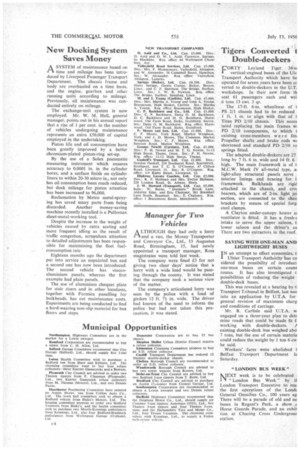New Docking System Saves Money
Page 42

If you've noticed an error in this article please click here to report it so we can fix it.
ASYSTEM of maintenance based on time and mileage has been introduced by Liverpool Passenger Transport Department. The chassis frame and body are overhauled on a time basis, and the engine, gearbox and other running units according to mileage. Previously, all maintenance was conducted entirely on mileage.
The exchange-unit system is now employed. Mr. W. M. Hall, general manager. points out in his annual report that a rise of 1 per cent, in the number of vehicles undergoing maintenance represents an extra £50,000 of capital employed in the undertaking.
Piston life and oil consumption have been greatly improved by a better chromium-plated piston-ring set-up.
By the use of a Solex pneumatic measuring instrument which ensures accuracy to 0.0001 in. in the cylinder bores, and a surface finish on cylinder liners to within 20-30 micro in., not only has oil consumption been much reduced, but dock mileage for piston attention has been increased to 96,000.
Reclamation by Metco metal-spraying has saved many parts from being discarded. Another money-saving machine recently installed is a Pullomax sheet-metal-working tool.
Despite the increase in the weight of vehicles caused by extra seating and more frequent idling as the result of traffic congestion, scrupulous attention to detailed adjustments has been responsible for maintaining the fleet fuelconsumption rate Eighteen months ago the department put into service an unpainted bus and a second one has now been introduced. The second vehicle has stuccoaluminium panels, whereas the first example had plain panels.
The use of aluminium chequer plate for stair risers and in other locations, together with Formica panelling for bulkheads, has cut maintenance costs. Experiments are being conducted to find a hard-wearing non-slip material for bus floors and steps.












































































































